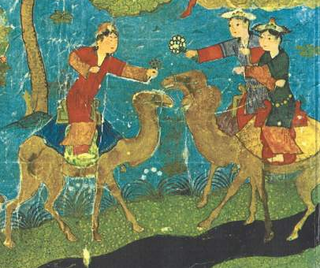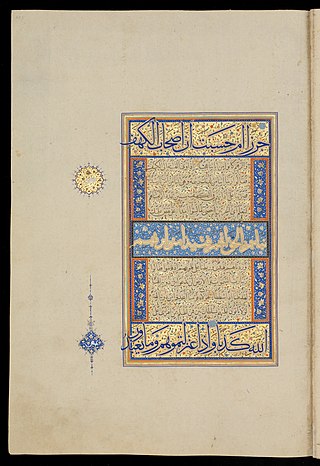
In Islam, a houri, is a woman with beautiful eyes who is described as a reward for the faithful Muslim men in paradise. The term is used four times in the Quran, where the houris are mentioned indirectly several other times,, and hadith provide a "great deal of later elaboration". Houris have been said to have "captured the imagination of Muslims and non-Muslims alike". Muslim scholars differ as to whether they refer to the believing women of this world or a separate creation, with the majority opting for the latter.
In Shia Islam, the Imamah is a doctrine which asserts that certain individuals from the lineage of the Islamic prophet Muhammad are to be accepted as leaders and guides of the ummah after the death of Muhammad. Imamah further says that Imams possess divine knowledge and authority (Ismah) as well as being part of the Ahl al-Bayt, the family of Muhammad. These Imams have the role of providing commentary and interpretation of the Quran as well as guidance.

Al-Fatiha is the first surah (chapter) of the Quran. It consists of 7 ayah (verses) which are a prayer for guidance and mercy. Al-Fatiha is recited in Muslim obligatory and voluntary prayers, known as salah. The primary literal meaning of the expression "Al-Fatiha" is "The Opener/The Key".
Al-Ikhlāṣ, also known as the Declaration of God's Unity and al-Tawhid, is the 112th chapter (sūrah) of the Quran.

The Night of Power, is, in Islamic belief, the night when Muslims believe the Quran was first sent down from heaven to the world and also the night when the first verses of the Quran were revealed to the Islamic prophet Muhammad; it is described to be better than a thousand months of worshipping. According to various hadiths, its exact date is uncertain but it was one of the odd-numbered nights of the last ten days of Ramadan, the ninth month of the Islamic calendar. Since that time, Muslims have regarded the last ten nights of Ramadan as being especially blessed. Muslims believe that the Night of Qadr comes again every year, with blessings and mercy of God in abundance. They believe that sins are forgiven, supplications are accepted, and that the annual decree is revealed to the angels who carry it out according to God's grace.

Al-Anfal is the eighth chapter (sūrah) of the Quran, with 75 verses (āyāt). Regarding the timing and contextual background of the revelation, it is a "Medinan surah", completed after the Battle of Badr. It forms a pair with the next surah, At-Tawba.
An-Nisa' is the fourth chapter (sūrah) of the Quran, with 176 verses (āyāt). The title derives from the numerous references to women throughout the chapter, including verse 34 and verses 4:127-130.

Al-Kahf is the 18th chapter (sūrah) of the Quran with 110 verses (āyāt). Regarding the timing and contextual background of the revelation, it is an earlier Meccan surah, which means it was revealed in Mecca, instead of Medina.
Al-Muʼminun is the 23rd chapter (sūrah) of the Qur'an with 118 verses (āyāt). Regarding the timing and contextual background of the supposed revelation, it is an earlier "Meccan surah", which means it is believed to have been revealed before the migration of the Islamic prophet Muhammad and his followers from Mecca to Medina (Hijra).
Ash-Shu‘ara’ is the 26th chapter (sūrah) of the Qurʾan with 227 verses (āyāt). Many of these verses are very short. The chapter is named from the word Ash-Shu'ara in ayat 224. It is also the longest Meccan surah according to the number of verses.
Ad-Dukhan is the 44th chapter (surah) of the Quran with 59 verses (ayat). The word dukhan, meaning 'smoke', is mentioned in verse 10.
Al-Qiyama or Al-Qiyamah, meaning "The Resurrection", or "The Rising of the Dead", is the seventy-fifth chapter (sūrah) of the Quran, with 40 verses (ayah).
Ash-Shams is the 91st surah of the Qur'an, with 15 ayat or verses. It opens with a series of solemn oaths sworn on various astronomical phenomena, the first of which, "by the sun", gives the sura its name, then on the human soul itself. It then describes the fate of Thamud, a formerly prosperous but now extinct Arab tribe. The prophet Saleh urged them to worship God alone, and commanded them in God's name to preserve a certain she-camel; they disobeyed and continued to reject his message; they killed the she-camel and God destroyed them all except those who had followed Salih.

ʿAbd Allāh ibn ʿAbbās, also known as Ibn ʿAbbās, was one of the cousins of the Islamic prophet Muhammad. He is considered to be the greatest mufassir of the Qur'an.
ʿAbd al-ʿUzzā ibn ʿAbd al-Muṭṭalib , better known as Abū Lahab was the Islamic prophet Muhammad's half paternal uncle. He was one of the Meccan Qurayshi leaders who opposed Muhammad and was condemned in Surat Al-Masad of the Quran.
Verse 29 of chapter 9 of the Qur'an is notable as dealing with the imposition of tribute (ǧizya) on non-Muslims who have fallen under Muslim rule. Most Muslim commentators believe this verse was revealed at the time of the expedition to Tabuk to threaten the Christians of Arabia in Syria and those of Rome.:239-240

The hadith of the warning, also known as the invitation of the relatives, is an Islamic tradition (hadith) that describes how the Islamic prophet Muhammad made his prophetic mission public. There are two versions of this hadith, both of which are linked to the verse of the ashira, that is, verse 26:214 of the Quran, the central religious text in Islam. In one version, Muhammad addresses his clan and likens the Judgement Day to an approaching enemy. In the other version, found in Shia and some Sunni sources, Muhammad invites his close relatives to Islam after a meal and seeks their assistance and deputyship. Among them, his young cousin Ali ibn Abi Talib is the only one who offers his help to Muhammad, who then announces him as his heir and successor.
The Shi'a view of Aisha is generally unfavourable. This is primarily due to what they see as her contempt for the Ahl al-Bayt and her actions in the First Fitna of the time. Her participation in the Battle of the Camel is widely considered her most significant sign of such contempt. Shi'a also consider Aisha to be a controversial figure because of her political involvement during her lifetime. Aisha came from a political family lineage, as she was the daughter of Abu Bakr, the first caliph. Aisha also played an active role in Muhammad's political life; she was known to accompany him to wars, where she learned military skills, such as initiating pre-war negotiations between combatants, conducting battles, and ending wars.
Al-Masad (Arabic: المسد, is the 111th chapter of the Quran. It has 5 āyāt or verses and recounts the punishments that Abū Lahab and his wife will suffer in Hell.
According to Islamic tradition, the Quran was revealed to the Islamic prophet Muhammad by the angel Gabriel (Jibril) in seven ahruf, translated variously as "styles", "ways", "forms" and "modes". Islamic scholars agree that the ahruf were styles used by the early Muslims to recite the Quran.